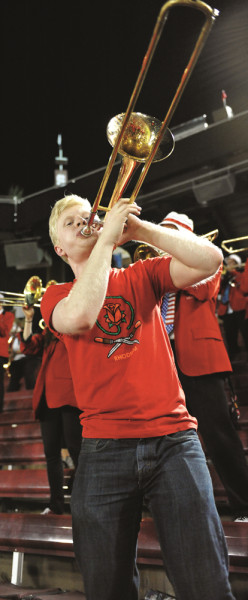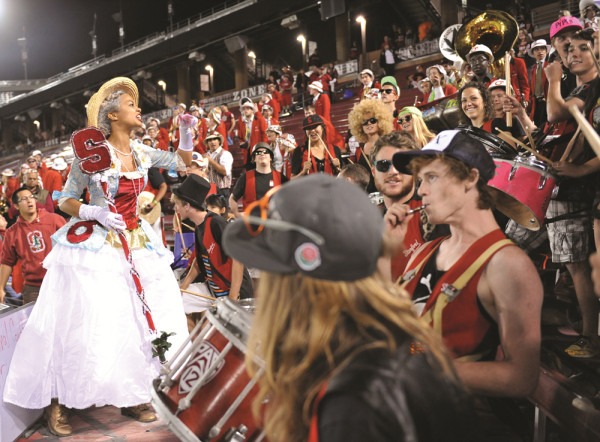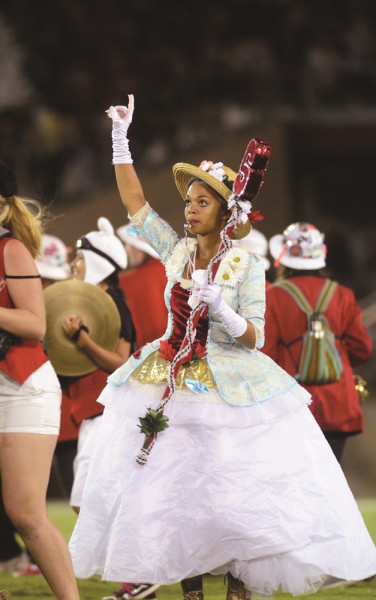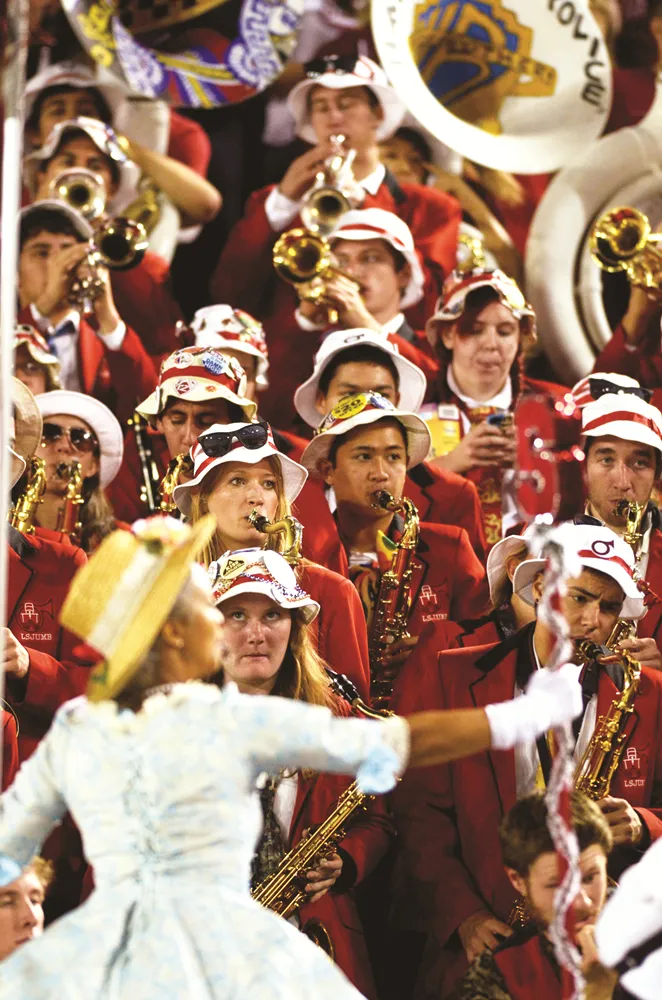Standing atop a mobile tower, overlooking a grass field and its current congregation of around 50 Stanford students, Giancarlo Aquilanti D.M.A. ’96 introduces himself.
Most of the ground-level crowd already knows the man with the microphone and scream out his name (“Giancarlo!”) before he has a chance to state it himself.

Aquilanti laughs and presses on, sharing that he is a music professor and conductor of the Leland Stanford Junior University Marching Band (LSJUMB). He makes the announcement mostly for the sake of the crowd’s freshmen, who will be performing, for their first time, as LSUMB members the following evening at the Oct. 5 football game against the University of Washington.
Before the fluorescent Stanford Stadium lights go on, the Band members are getting prepped at Friday afternoon field rehearsal.
“There are some formalities that we have to take care of at the beginning,” Aquilanti says, acknowledging the newcomers. “Sometimes, they’re funny. Sometimes, they’re gross. Sometimes, they’re both.”
On this note, trumpet section leader Kyle Fierro ’14 walks forward, instrument in hand, and stops near the base of the tower. The rest of the Band forms a circle around Fierro, who begins playing his opening trumpet solo of “The Star-Spangled Banner.” All seems ordinary until a Band member returns, bearing a padded jousting stick. This second member proceeds to strike Fierro with the toy weapon, as the trumpet player continues his solo.
Fierro finishes without missing a note.
“That is the formality,” Aquilanti says, after the ritual has concluded. “Now, we have to do something that’s not a formality: tuning.”
Funny, gross or both
When Aquilanti warned the new members they were about to see something that’s sometimes “funny,” sometimes “gross” and sometimes “both,” he was referring to the group’s long-running tradition of putting the trumpet soloist through a minor form of torture during field rehearsals leading up to a football game. The idea is that if the soloist can perform during rehearsals under somewhat harsh conditions, he can perform at show time, even when thousands of spectators’ eyes are directed towards him.
But the remark could just as easily apply to the entire Band: It’s sometimes funny, sometimes gross, and at its best, both.
A scatter band differs from most university marching bands in that members are not assigned marching routes or individual positions during field shows. Instead, they stand and perform in loose formations, which spell out words and make images.
For LSJUMB members, being in a scatter band means technical precision becomes less important than other attributes such as humor, free-spiritedness, confidence, inclusivity and overall fun. The group’s pregame and halftime shows, for instance, often double as comedic sketches.
Give ‘em a show
Andrew Kleinschmidt ’14 and Matt Appleby ’15 bear ultimate creative responsibility for the Band’s field shows. Both share the position of “Graphix.”
“We’re kind of the overarching controller of the field shows from start to finish,” Appleby said.
He proceeded to detail their responsibilities, which include choosing a staff of writers, selecting the theme for each show, working with writers to complete (or write for themselves) the scripts, bringing these scripts to a University review committee for approval, designing field charts and running rehearsals.
But Kleinschmidt and Appleby both said they love their job. They excitedly discussed the genesis of the field shows for the University of Washington game.
The first idea came during the summer, when they heard Stanford Stadium would be introducing closed captioning to the Band’s field performances this season.

“Somebody told us that, and we thought, ‘It would be funny if we wrote a show about us finding out that there’s closed captioning now,’” Appleby said. “We wrote that actually a long time ago, and kept revising it in the weeks after that.”
The second idea came more serendipitously. Kleinschmidt said he brainstormed a list of everything he associated with the state of Washington. The Space Needle, Nirvana, grunge and Starbucks all appeared on the paper before he happened to write the line: “Washington, you look great in your snazzy purple uniforms.”
“I was like, OK, first of all, I would just like writing about their purple uniforms in general,” Kleinschmidt said. “But then, I remembered I was talking to someone the week before about Arizona State’s uniforms and how they look a little bit ridiculous, and I think Oregon’s uniforms are just inherently funny, so I decided, ‘Why don’t we just do the Pac-12 Fashion Review?’”
Presenting the scripts to the University review committee, which includes officials from Student Affairs and the Department of Athletics, went well, according to Appleby. Initially, the committee was formed to prevent obscene or offensive material from making it into the Band’s field shows. In recent years, however, the Band and the committee members have become more like collaborative partners.
“They’ll tell us what parts of it would be of concern to them, but once that’s been voiced, it sort of turns into: ‘How can we make this funnier?’ ‘How can we improve it given the current events that are happening right now?’” Appleby said.
According to Kleinschmidt, the committee did have one concern before the Washington game: The original script included several jokes about the University of Oregon’s uniforms, which are manufactured by Nike. It turned out that Nike co-founder and chairman Phil Knight MBA ’62, the man who also donated $105 million to construct a new campus for the Stanford Graduate School of Business, would be attending the Saturday game.
“We couldn’t be insulting a potential donor at a game that he was going to be at,” Appleby said.
University officials recommended they move their satirical gaze to USC. Kleinschmidt and Appleby said they saw plenty of comedic material in the substitution, so they decided to accommodate the suggestion.
The face of the band
Annalise Lockhart ’14 first visited California during her own Admit Weekend. She said prior to her flight from New York, she was concerned whether or not she would fit in on The Farm. Those fears dissipated, however, as soon she saw the Stanford Band perform during an event for prospective freshmen.

“I was really worried about what Stanford would be like,” Lockhard said. “Then, I saw the Band playing in the Admit Weekend rally, and I knew there would be weird people here that I could bond with.”
Nearly four years later, she’s now drum major, a position also known as Band’s “spiritual leader.” For each field show, she’s responsible for choosing the song list, cutting down songs for time, leading a portion of rehearsals and also, as the public face of the Band, creating an elaborate costume to wear. She has an office in the Band Shak crammed with sequins, hot glue guns, ribbons and old outfits for the last task.
“The Band major should be a figure that changes constantly and is constantly pushing up against what a leader’s like,” Lockhart said. “Sometimes, I try to be really intense, almost metal-like, but then at other times, really goofy, and I think a leader can be those things. My costume choices try to reflect that: switching around a lot.”
For the Washington game, Lockhart decided to dress as Marie Antoinette.
“Last game before, I was Thor, which is first of all, a man, but also a male god,” Lockhart said. “This week, I wanted to do something that was flipping it completely: being very feminine, but also being a feminine symbol of power.”
According to Lockhart, there’s an unwritten rule amongst former drum majors that a costume will never be repeated. She said costumes ideas must be checked through a message to an email list to which all previous drum majors are subscribed.
She hasn’t run into too many problems with already-used costume ideas so far, but it helps that she is only the sixth female drum major in the 50-year history of LSJUMB.
“A lot of guy drum majors cross-dress, but there’s still many female characters throughout history and media that have not been done before,” Lockhart said.
Preparing for Homecoming
Just minutes after LSJUMB took the field for their halftime show at the Washington game, a Band alumnus sent an email to the entire group. He quite simply wrote: “That show was pretty terrible. Please be funnier.”
Kleinschmidt and Appleby agreed that reaction to their Washington field performances was mixed, saying they knew the closed captioning show in particular was going to be “hit-or-miss” with the audience because of its absurdist humor. They added, however, that the Band is usually its own worst critics.
“We get feedback from the Band pretty directly,” Kleinschmidt said.
That makes their next task — writing a field show for the Band’s 50th anniversary this Saturday—even more difficult.
“Basically, for this reunion show, it feels like we have to be funny, we also have to be historical and we also have to represent the Band in a somewhat-good way,” Appleby said.
“It’s an interesting mixture of people we are trying to please,” Kleinschmidt added.
Still, the two said they’re up for the challenge.
“It’s going to be a mess, but it’s going to be a great mess — a glorious mess,” Kleinschmidt said.
And LSJUMB wouldn’t have it any other way.
Contact Kurt Chirbas at kchirbas ‘at’ stanford.edu.
